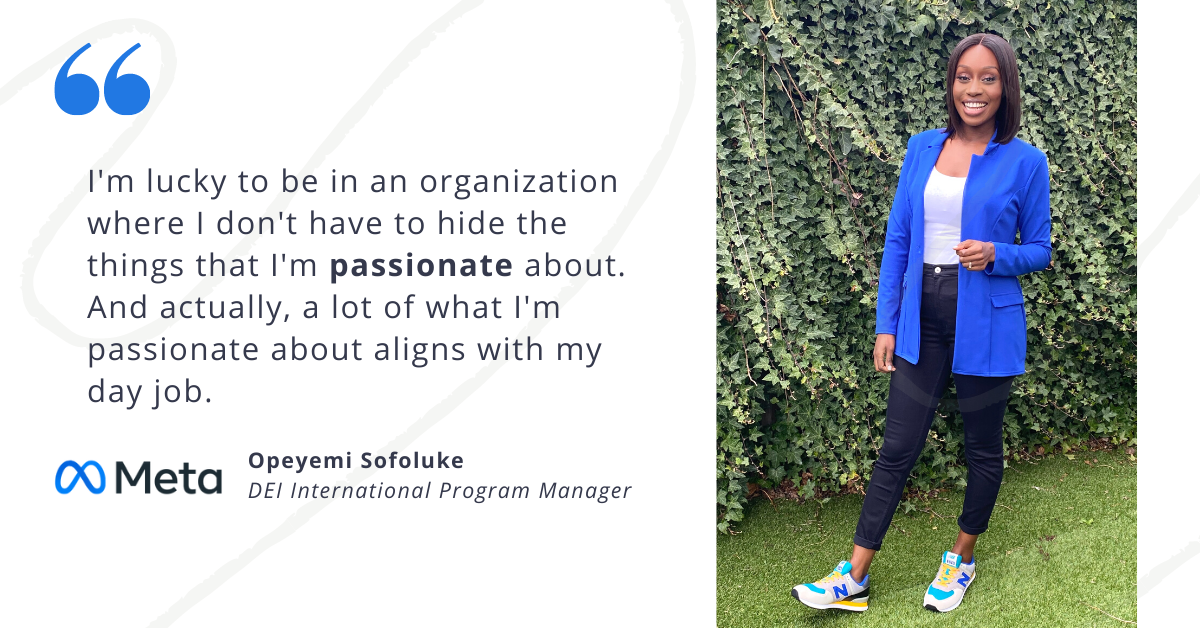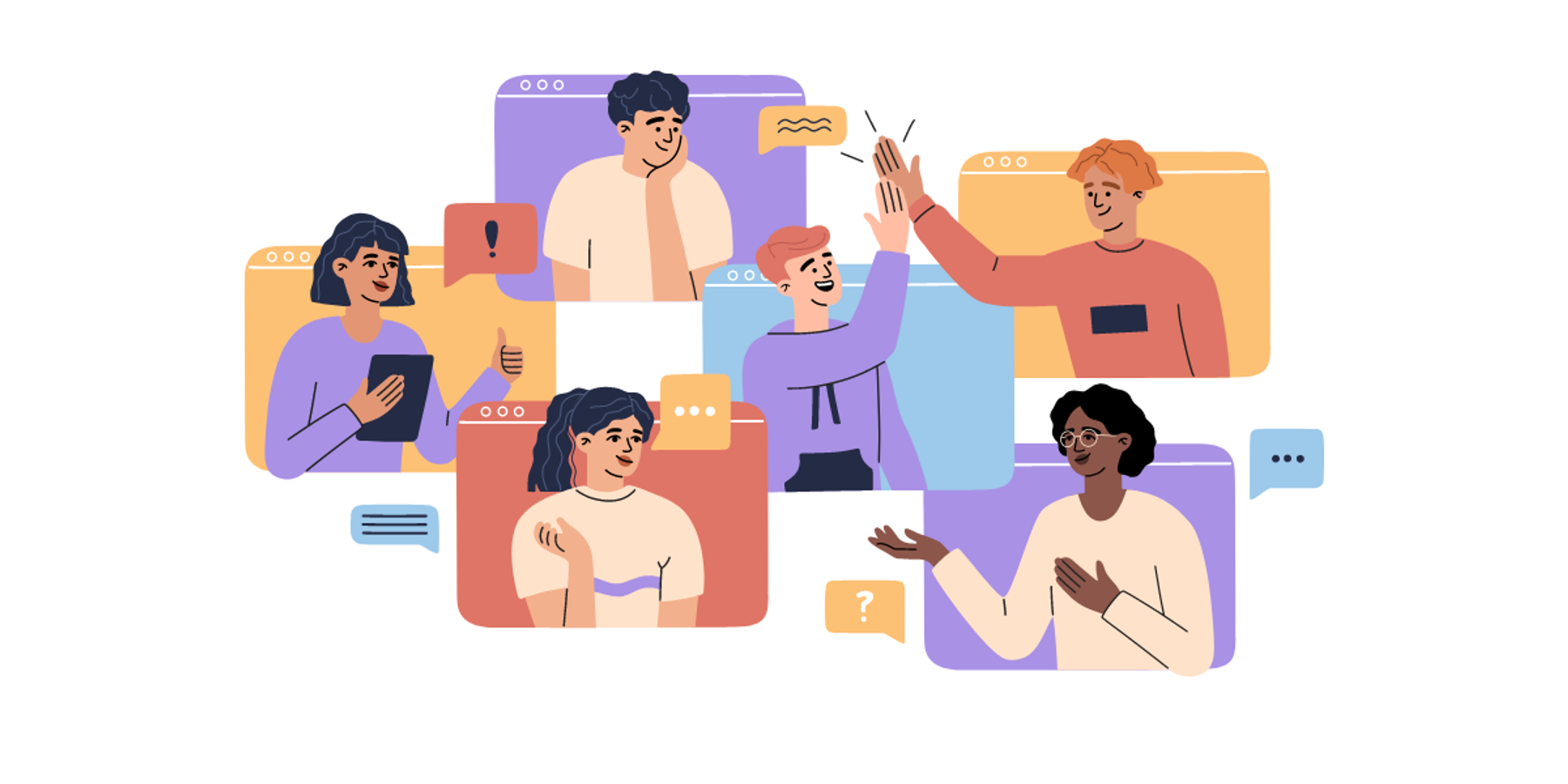Opeyemi Sofoluke knows there’s not one single word or aspect of her life that defines her.
Not being a mother, or the DEI International Program Manager at Meta, or the co-author of the book Twice as Hard.
“Black is not a monolith, or being a woman is not a monolith. There are so many dimensions to who we are as people,” says Opeyemi.
In her own life, she has embraced those dimensions, combining career growth and personal growth by pursuing her interests at work and beyond.
That’s what led to the book that she co-authored with her husband—and in which she explores how to create space for Black talent to thrive by tracing the stories of 40 entrepreneurs and professionals.
Twice as Hard was written in four months during the pandemic, while Opeyemi was working and also raising her two young children along with her husband. But she didn’t see the project as something that took time away from her roles at work and at home, but rather that added to both.
“I'm lucky to be in an organization where I don't have to hide the things that I'm passionate about. And actually, a lot of what I'm passionate about aligns with my day job,” she says.
We sat down with Opeyemi to ask how she balances her impactful work at Meta with her personal passions beyond tech—and what advice she has for other people looking to do the same.
A passion to create change
Opeyemi isn’t new to the whole juggling-two-or-more-interests thing. She was interested in both business and politics while at university, so did a combined honors degree in both subjects.
“It comes from a passion and desire to create positive change in spaces where I find myself,” says Opeyemi of what drives her to take on more.
The first space she found herself in after university was banking, because she wanted to build her career in a strong industry with lots of learning opportunities. But she had trouble feeling like she was making an impact.
“Being a change agent, creating spaces for people to be themselves—I wasn’t doing that in my day-to-day,” she says.
So Opeyemi started volunteering and joining employee resource groups, which is how she found an opportunity with her firm’s social responsibility arm using the company’s technologists to support NGOs and charity organizations.
Working with the mostly-white, mostly-male tech world inspired Opeyemi to pursue DEI work. She’s particularly excited about the challenges of her field compared to others: “There is still so much opportunity to change the face and technology, and make it more diverse and representative of the world and the actual global majority that we see today.”
She was ready for her next challenge when she heard about the job at Meta. Now, as their DEI International Program Manager, Opeyemi’s days are spent working with Meta’s nine employee resource groups across the three regions—Asia Pacific, Europe / Middle East / Africa, and Latin America—that she supports.
That can include things like supporting the Meta employee resource groups in building out their strategy, determining key priorities to activate against and amplifying community concerns to senior leadership, or supporting the planning and programming of community Heritage Months across the regions such as International Women’s Day or Black History Month in all its forms: in October in the UK, in November in Brazil, in May in other parts of Europe, and in February in the U.S and Germany.
Opeyemi is cognizant of her own various identities, passions, and interests, and knows that the Meta community as a whole has the same diversity of experiences.
“We want to make sure that the programming is truly intersectional,” she says. “So for Black History Month, for example, we want to make sure you’re seeing programming that is relevant to someone who may be Black and disabled, or Black and a mother.”
Making time for growth outside of work
Opeyemi didn’t set out to write a book. But in 2019, her husband, who is the founder of the UK Black Business Show and UK Black Business Week, had an idea about writing a book that would be relevant for Black professionals and entrepreneurs.
“We were really intentional about addressing topics that would’ve been helpful for us when we started our career. What are some key areas that would’ve been important to address?” she says. They came up with a chapter list featuring everything from building a personal brand, to how to network and relationships to how to navigate white spaces, and got to writing. They also came up with a list of professional sources to interview.
“When people think about successful Black people, they often think about sports or entertainment. But the reality is we can be successful wherever we find ourselves, and we should not put ourselves in a box,” she says. That’s why Twice as Hard includes stories from people such as Matthew Knowles, who managed his daughters’ careers, and Pamela Hutchinson, Global Head of D&I at Bloomberg.
Opeyemi sees her book as having two messages.
The first is for the Black community, and it’s one of hope and inspiration.
“It was important to demonstrate that the struggle has been around for a long time, and even though it still exists, people are doing excellent things,” she says. “We idolize people that have made it, and we don’t see their journey. Imagine a portrait in a gallery. You don’t see the nights where the artist sat there saying, ‘How should I paint this picture?’ We just see the end result. But it’s important to highlight the work that people have put into their careers, the challenges that people have faced, because those challenges are not necessarily unique. They’re all things we can identify with.”
The second message is for people outside of the Black community, including allies.
“We’re giving you that insight into our world,” says Opeyemi. “Hopefully, then you’re more informed on our experiences and can therefore be a better, a more active, a more intentional ally, because you know what to look out for.”
4 tips for balancing passions
The process of writing, publishing, and promoting the book is something that Opeyemi has balanced with her day job, though her passion to support her community and her work to do the same are clearly aligned.
For others looking to do the same, whether with complementary interests or not, Opeyemi suggests:
- Figure out what balance looks like to you. Opeyemi considers herself an “intrapreneur”—someone who is able to deliver on new ideas in a working environment, but doesn’t have to set out on their own to do it. “If someone else wants to go off and be an entrepreneur, that’s great. You just have to set yourself up to actually get there, so you can make sure that financially you are secure,” she says. But it’s also entirely possible to follow her path and keep a full-time job while pursuing extracurricular growth, she says.
- Remind yourself that you deserve the investment. Working on a passion project often requires an investment of money, time and effort. “Whether that’s on your weekends or in the evenings, it’s about finding ways to make the time for you to deliver on that passion,” she says. Stay disciplined and motivated by reminding yourself that the investment will be worth it in the end and you deserve to work on and invest in projects that bring you joy.
- Share your work with your team. Support is a major factor when creating a product or project on your own. Don’t be afraid to showcase what you’re working on to others. You might get that extra support you need, or even gain a connection to someone who can help. “Imagine if I kept it quiet that I’ve got this book coming,” she says. “You don’t want to hide away a gift or a talent.”
- Recognize the impact that your work will have on your broader communities. “Often when you are passionate about something or when you’re creating something, it’s not just for yourself,” says Opeyemi. “When you think about a creator, they’re creating for a community.”
To hear more from Opeyemi and other women at Meta about balancing their impact at work and in their communities, check out this Beyond Women’s History Month event video!




